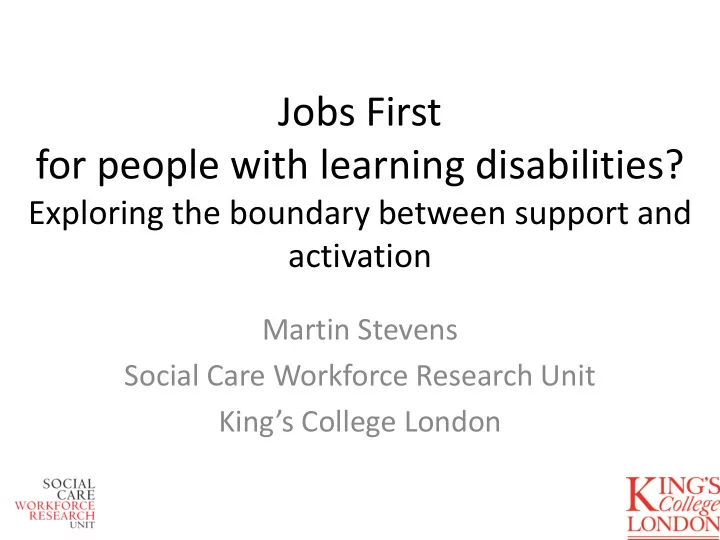

Jobs First for people with learning disabilities? Exploring the boundary between support and activation Martin Stevens Social Care Workforce Research Unit King’s College London
Introduction • Policy connections • Jobs First evaluation • Labour activation • Forms of governance and subject positions in Jobs First • Jobs First in relation to labour activation for non disabled people • Learning Disabled Identity • Conclusion
Policy connections • ‘We will legislate to ensure that everyone can take control of their care and support by giving them an entitlement to a personal budget.’ (HMG, 2012: 54) • ‘encouraging and supporting employment , local mentoring and volunteering activity at an individual level’. (HMG, 2010: 12 emphasis added)
Jobs First • Refocusing social care support on employment for people with learning disabilities • Personal budgets to purchase supported employment services • Parallel with other labour activation programmes for disabled and non disabled people • Multiple funding streams • Five local authority sites took part in the project
Jobs First evaluation • Comparison group study – Cohort of 20 people with learning disabilities per site – Matched comparison group • Process evaluation involved 139 interviews with – Jobs First Leads - 18 (9, 2 rounds) – Other managers and professionals - 19 (once only) – Social workers/care workers - 17 (once only) – Job coaches – 12 (once only) – People with learning disabilities - 50 (25, 2 rounds) – Carers - 23 (once only)
Labour force activation • A long history back to 16 th Century: ‘sending vagrants to work’ (Patrick, 2012:6) • ...the economically inactive and unemployed [are] constructed as ‘problematic’ populations who need tough interventions if their behaviour is to be changed such that they become working and productive members of mainstream society. (Patrick, 2012: 5) • Creates more exclusion for those unable to work
Labour activation, governance and subject position – Newman, 2007) Forms of Approach to activation Subject positions governance Hierarchical Coercive, using sanctions Rational citizen acting in and rewards own interest Managerial Standard settings, Consumer of services incentives, contracts Network Policy networks and Collaborator/partner partnerships between agencies and independent sector services Self Creating new norms and Autonomous citizen expectations adopting policy goal
Forms of governance – subject positions in Jobs First • Hierarchical – Rational Citizen responding to public spending cuts and welfare benefit changes: – ‘ so what we are doing is the bare minimum and making sure that people are safe and then moving onto the next person, because there is no capacity to do it any more than that. JF6 JF Lead MS05 R2 • Managerial – Consumer of services provided by a ‘plural market’ (HMG 2010: 21), which: – ‘can also include more mainstream and universal service providers – for instance, those offering transport or leisure options, or employment and education support – which are able to cater for people’s needs without operating exclusively in the social care sector’ (HMG 2010: 21).
More forms of governance – subject positions • Network – Collaborator with local authorities and employment support services – Improving partnership working, in which closer working is to be developed by adopting a ‘joined-up approach between social care, housing, employment and other sectors’ (HMG 2010: 23). • Self – Citizen adopting policy as personal goal – Employment can feel like something that’s quite worrying. At the start people feel worried about their own capability. Will I be able to do this? Will I get the sack if I have problems in the job? JF2 Jobs First Lead MS06 R1
Jobs First Jobs First in relation to labour activation for non disabled people • Aims match labour force activation • Language linked to normalisation and social role valorisation – What we have done is given reassurances that it is not about taking something away... It’s more about creating opportunities where we can for people into paid work, JF 2 Jobs First Lead MS06R1 • However a mix of moral pressure and opportunity: – ... I believe everyone should work , really. Have the opportunity to work at least. JF4 Adult Social Care JH17 (Emphasis added)
No sanctions for people with learning disabilities ‘So if you’re unemployed and refuse to take either a reasonable job or to do some work in your community in return for your unemployment benefit you will lose your benefits for three months. Do it again, you’ll lose it for 6 months. Refuse a third time and you’ll lose your unemployment benefits for three years.’ Cameron 2011b http://www.guardian.co.uk/politics/2012/jun/ 25/david-cameron-sweeping-welfare-reforms
Learning disability identity • Traditionally, a biologically driven identity based on deficits of intellectual and social functioning, often established through IQ scores and fixed by professionals • Therefore people with learning disabilities seen as less morally responsible for their behaviour (Finlay and Lyons, 2008) • Jobs First promotes citizenship and a means of moving away from the traditionally ascribed identity • Focus on the positive elements of employments perpetuates the fixed learning disabled identity linked.
Conclusion • Hierarchical governance applied with less force to people with learning disabilities, who are not therefore seen as ‘instrumental actors responding to new incentives’ (Newman, 2007: 14) • The difference in emphasis gives out a message that people with learning disabilities cannot be expected to take on the same responsibilities as non disabled people and are therefore never to achieve full citizenship • Positive side effects – Better long term employment outcomes (Eichorst and Konle-Seidl, 2008) – Fewer tensions between subject positions • Perpetuates an excluded identity
Thank you! Martin Stevens 020 7848 1860 – martin.stevens@kcl.ac.uk Disclaimer This research draws on findings from the Jobs First Evaluation funded by the Department of Health and undertaken by the Social Care Workforce Research Unit. The views expressed in this report are those of the author alone and are not necessarily shared by the Department of Health.
Recommend
More recommend